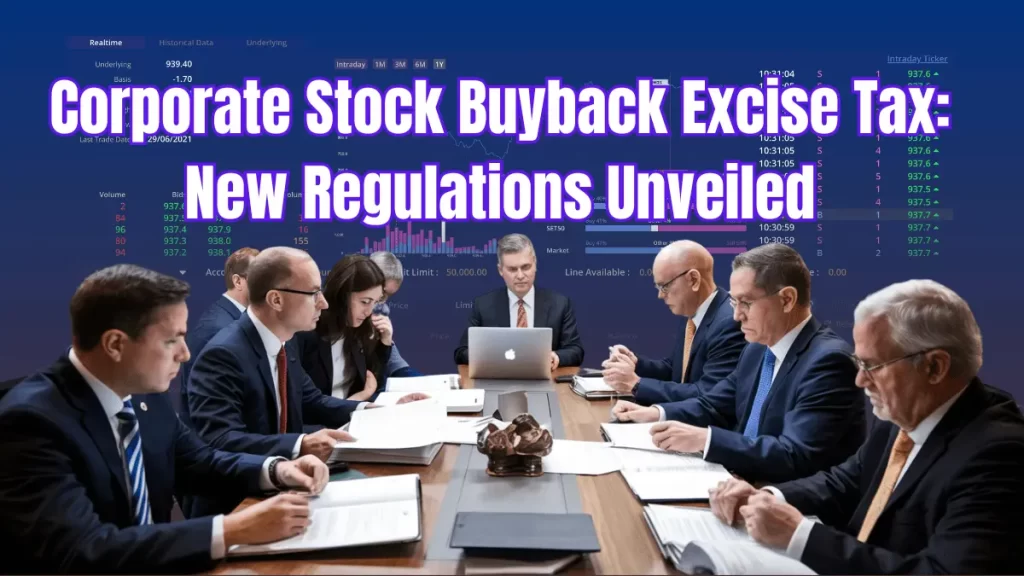A Shift in Strategy: Exploring the Impact of the New Stock Buyback Excise Tax
In a move that’s sending ripples through corporate boardrooms and Wall Street alike. The IRS has finalized regulations on the 1% excise tax for corporate stock repurchases. This development, announced on June 28, 2024, marks a significant shift in how companies approach one of their favorite tools for returning value to shareholders.
The Backstory
The excise tax, originally introduced as part of the Inflation Reduction Act of 2022. Aims to discourage what some policymakers view as excessive stock buybacks. The underlying idea? Encourage companies to reinvest profits into growth, innovation, or employee wages rather than boosting stock prices through repurchases.
Key Points of the New Regulations

1. Targeted Exemptions
Real Estate Investment Trusts (REITs) and Regulated Investment Companies (RICs) caught a break. These entities are now exempt from filing excise tax returns when their repurchases fall under statutory exceptions. However, they’re not entirely off the hook – they still need to maintain records of these transactions.
2. Streamlined Filing Requirements
In a nod to practicality, the IRS has decided that covered corporations only need to file an excise tax return in years when they actually conduct stock buybacks. This approach cuts down on unnecessary paperwork for companies that don’t regularly engage in repurchases.
3. Deadline and Transition Period
Mark your calendars: October 31, 2024, is the first filing deadline. The IRS has also included a transition period ending June 28, 2024, giving companies some breathing room to adjust their practices and reporting systems.
4. New Reporting Forms
Companies will use Form 720 (Quarterly Federal Excise Tax Return) with an attached Form 7208 (Calculation of Section 4501 Excise Tax on Repurchases of Corporate Stock) to report and calculate the tax. The IRS has promised to provide the final version of Form 7208 before the first due date.
Art of Investment – Mutual Fund Portfolio: The Art of Balancing Quality Over Quantity
Implications for Corporate America
These new regulations are more than just a tax change – they’re a potential game-changer for corporate finance strategies. Here’s what it could mean:

- Rethinking Capital Allocation: The 1% tax might make buybacks slightly less attractive compared to other options like dividends, capital investments, or M&A activities.
- Compliance Challenges: Finance and tax departments will need to quickly get up to speed, potentially requiring new training, processes, or even software systems.
- Market Dynamics: This could subtly shift how investors view companies that frequently engage in stock repurchases, potentially impacting stock prices.
- Global Considerations: Multinational corporations face an added layer of complexity, needing to consider how global stock repurchases might trigger U.S. tax obligations.
- Evolving Landscape: As with any new tax regulation, further clarifications or adjustments may come as regulators observe real-world implementation.
Looking Ahead
These regulations represent a significant pivot in how stock buybacks are treated from a tax perspective, reflecting broader policy goals around corporate finance and economic growth. As companies digest these changes, we may see shifts in capital allocation strategies that could have far-reaching effects on the market and economy at large.
For now, corporate leaders and investors alike will be watching closely to see how these new rules play out in practice. One thing’s for certain: the era of unfettered stock buybacks may be coming to an end, ushering in a new chapter in corporate finance strategy.
Corporate Stock Buyback: Practical Examples
To better understand how the new 1% excise tax on stock buybacks will affect companies, let’s look at some hypothetical scenarios:

Example 1: Tech Giant “Innovate Corp”
Scenario:
Innovate Corp, a large technology company, plans to repurchase $10 billion worth of its own shares in 2025.
Impact of Excise Tax
- Excise Tax: $100 million (1% of $10 billion)
- Filing Requirement: Innovate Corp must file Form 720 with Form 7208 attached by October 31, 2026.
- Strategic Consideration: The company might reconsider the scale of its buyback program. For instance, they could reduce the buyback to $9 billion and allocate the $1 billion (plus $90 million saved in taxes) to R&D or employee benefits.
Example 2: Regional Bank “Community First”
Scenario:
Community First Bank typically conducts small buybacks of $50 million annually but decides to skip repurchases in 2025.
Impact of Excise Tax
- Excise Tax: $0
- Filing Requirement: No need to file Form 720 or Form 7208 for 2025.
- Record Keeping: Despite not conducting buybacks, CommunityFirst should maintain records to demonstrate compliance.
Example 3: REIT “Urban Spaces”
Scenario:
Urban Spaces, a Real Estate Investment Trust, repurchases $200 million of its shares as part of a reorganization that qualifies for a statutory exception.
Impact of Excise Tax
- Excise Tax: $0 (exempt due to qualifying exception)
- Filing Requirement: No need to file Form 720 or Form 7208.
- Record Keeping: Urban Spaces must maintain detailed records of the repurchase and how it qualifies for the exception.
Example 4: Multinational Corporation “Global Goods”
Scenario:
Global Goods, with operations in the U.S. and abroad, repurchases $5 billion worth of shares globally, with $3 billion from U.S. operations and $2 billion from foreign subsidiaries.
Impact of Excise Tax
- Excise Tax: Potentially $50 million (1% of $5 billion), but the exact amount may depend on the structure of the foreign repurchases and their connection to U.S. operations.
- Compliance Challenge: Global Goods must carefully analyze which portions of its global repurchases are subject to the U.S. excise tax.
Example 5: Growth Company “Future Now”
Scenario:
Future Now, a fast-growing tech company, has never conducted buybacks before but is considering a $500 million repurchase program for 2025.
Impact on Growth Company “Future Now”
- Excise Tax: $5 million (1% of $500 million)
- Strategic Decision: Future Now might compare the buyback benefits (e.g., boosting stock price, signaling confidence) against the $5 million tax and alternative uses of the capital, such as accelerating product development.
- New Process: If they proceed, Future Now must establish new procedures for calculating, reporting, and paying the excise tax.
These examples illustrate how the new regulations might influence corporate decision-making across various industries and company sizes. They highlight the need for careful planning and potential strategic shifts. The importance of maintaining accurate records even when exemptions apply.
Know more from IRS Official site: Excise Tax on Business and Self-Employed
Hi there! I am Sudip Sengupta, the face behind “Tfin Career”. Tfin Career is a sole proprietorship finance and consulting firm that makes complex tax and financial concepts easy to understand for everyone. With more than 21 years of experience in the field, I have noticed that people cannot make the right decisions in this field. So, I decided to create “Tfin Career” to help individuals and businesses alike. Here I urge those who are confused to make better choices. Also, it is good news for my dear clients and every visitor that I/we are going to start a training module for those who want to choose a career path in Finance and Taxation. Just follow my website.
Thank you for reading this post, don't forget to subscribe!






